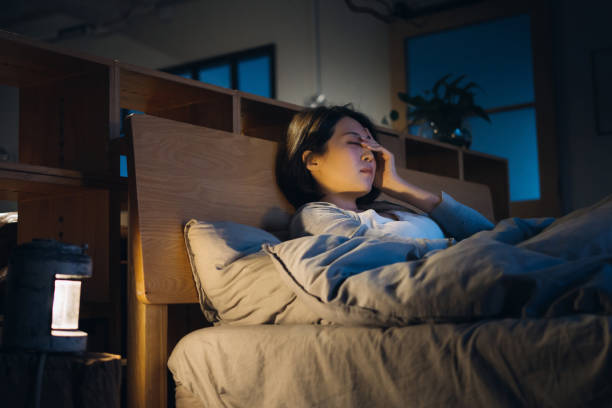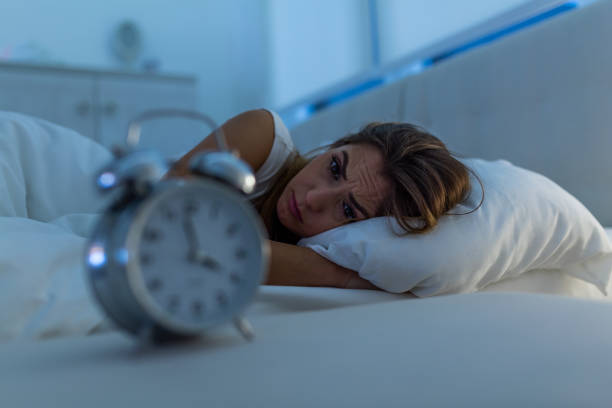Sleep plays a fundamental role in maintaining overall human health. However, in today’s fast-paced society, more and more people are struggling with insomnia. Insomnia, a common sleep disorder, involves difficulty falling asleep, staying asleep, or getting restful sleep. This condition can last for days, weeks, or even years, leading to serious mental and physical consequences.
In this article, we will thoroughly explore the causes of insomnia, its effects on everyday life, and most importantly, effective methods to overcome it. Along the way, we’ll touch on expert insights, statistics, and practical advice for better sleep.
Table of Contents
1. What Is Insomnia?

Insomnia, often termed sleeplessness, is a disorder characterized by persistent difficulty with sleep onset, sleep maintenance, or waking up too early without being able to return to sleep. The condition can be short-term (acute), lasting from a few nights to several weeks, or long-term (chronic), persisting for months or years. Chronic insomnia affects about 10% to 15% of adults, while short-term insomnia can affect up to 50% of the adult population at some point in their lives.
A healthy amount of sleep is essential for recharging our bodies and minds. Sleep is not only a time for physical rest but also an opportunity for the brain to process information, consolidate memories, and remove metabolic waste. Most adults require between seven and nine hours of sleep per night to feel fully refreshed. However, those suffering from insomnia often struggle to get even a few hours of sleep each night, leading to fatigue, reduced cognitive function, and an overall decrease in quality of life.
Sleep has different stages, including non-REM (Rapid Eye Movement) sleep and REM sleep, which are crucial for physical and mental health. REM sleep, for instance, is the phase where dreaming occurs, and it plays a significant role in memory and learning. People with insomnia often miss out on this stage, which impacts both short-term and long-term memory functions.
Insomnia can happen to anyone, but certain groups are more prone to it. Women, especially those who are pregnant or going through menopause, are more likely to experience insomnia. Older adults also tend to struggle with sleep disorders due to natural changes in their sleep-wake cycles and other age-related factors. Individuals with mental health disorders like depression, anxiety, and post-traumatic stress disorder (PTSD) are also more susceptible to insomnia.
2. Common Causes of Insomnia

Insomnia is not a standalone condition. It is often a symptom of underlying problems, such as psychological stress, unhealthy lifestyle habits, or certain medical conditions. Below, we delve into the common causes of insomnia in more detail.
2.1. Psychological Causes: Stress, Anxiety, and Depression
Emotional and psychological disturbances are among the leading causes of insomnia. Many people experience transient sleeplessness when facing major life events, like job loss, relationship breakdowns, financial instability, or the death of a loved one. This short-term insomnia typically resolves once the stressful situation has been addressed. However, in some cases, it can evolve into chronic insomnia, especially in individuals who are prone to anxiety and worry.
Anxiety disorders are known to disrupt sleep by creating excessive worrying and overthinking, which prevents the mind from relaxing. When lying in bed, people with anxiety often dwell on future uncertainties, heightening their stress levels and delaying the onset of sleep. This creates a vicious cycle: worry causes insomnia, and insomnia worsens anxiety.
Depression is another major factor contributing to sleep disturbances. Interestingly, insomnia is a two-way street with depression—it can either be a symptom or a contributing cause. Research shows that insomnia often coexists with depression, and people with chronic insomnia are at a much higher risk of developing major depressive disorder. Low levels of serotonin, a neurotransmitter that regulates mood and sleep, are commonly found in individuals with both conditions.
2.2. Lifestyle Habits: Caffeine, Alcohol, and Stimulants
Daily lifestyle choices also play a significant role in the onset of insomnia. Caffeine, the most widely consumed stimulant in the world, is notorious for disrupting sleep patterns. While a cup of coffee in the morning may enhance alertness, drinking caffeine too late in the day can interfere with the body’s ability to wind down for sleep. The half-life of caffeine (the time it takes for half of the caffeine to leave your bloodstream) can range from 3 to 5 hours, meaning it can remain in your system for a substantial amount of time after consumption. Studies have found that consuming caffeine even six hours before bedtime can reduce total sleep time.
Similarly, alcohol, although often considered a depressant, can lead to fragmented sleep. While alcohol may initially induce drowsiness, it disrupts the deeper stages of sleep, particularly REM sleep. Many people with insomnia use alcohol to self-medicate, thinking it will help them sleep, but this actually exacerbates the problem. Over time, reliance on alcohol to sleep can lead to alcohol dependence and worsen overall sleep quality.
Other substances, such as nicotine from smoking or certain prescription drugs like antidepressants or stimulants (e.g., for ADHD), can also interfere with sleep. Smoking, particularly close to bedtime, stimulates the nervous system, making it more difficult to fall asleep.
2.3. Medical Conditions Linked to Insomnia
Medical conditions such as asthma, chronic pain, gastrointestinal problems, and neurological disorders can also be major contributors to insomnia. Chronic pain conditions like arthritis or fibromyalgia cause discomfort that makes it hard to find a comfortable sleeping position, leading to frequent awakenings. Gastroesophageal reflux disease (GERD), a digestive disorder, often causes heartburn that worsens when lying down, disturbing sleep.
Sleep apnea, a disorder in which breathing repeatedly stops and starts during sleep, is a significant cause of insomnia. This condition is marked by loud snoring and episodes where the individual briefly stops breathing, prompting them to wake up gasping for air. These frequent interruptions prevent the person from getting the deep, restful sleep they need.
Neurological conditions such as Parkinson’s disease and Alzheimer’s disease are also associated with sleep problems, as they disrupt the brain’s ability to regulate the sleep-wake cycle. Additionally, restless leg syndrome (RLS), a condition where individuals feel an irresistible urge to move their legs, can cause discomfort and prevent people from falling or staying asleep.
2.4. Sleep Environment: Light, Noise, and Temperature
The environment in which you sleep is another crucial factor in determining sleep quality. Disruptions in the environment, such as noise from traffic or neighbors, can easily wake someone from sleep, especially if they are in the lighter stages of their sleep cycle. Light, particularly blue light emitted from phones, computers, and TVs, also inhibits the production of melatonin, a hormone that regulates sleep.
The room temperature can have a surprisingly large impact on sleep quality. Most experts recommend keeping the bedroom cool, ideally between 60 to 67 degrees Fahrenheit (15-20°C). When the body cools down during sleep, it signals the brain to enter a state of rest. A room that’s too hot or too cold can interrupt this process.
2.5. Age and Hormonal Changes
As people age, changes in their circadian rhythm, the body’s internal clock that regulates sleep-wake cycles, make it more difficult to get consistent, restful sleep. Older adults tend to wake up earlier, have trouble staying asleep, and often experience lighter, more fragmented sleep.
Hormonal changes can also disrupt sleep, particularly in women. During pregnancy, the physical discomfort and hormonal fluctuations often make sleep difficult. After childbirth, mothers may suffer from insomnia due to the demands of caring for a newborn and postpartum mood disturbances. In addition, menopause brings about hot flashes, night sweats, and hormonal shifts that contribute to insomnia in many women.
3. The Consequences of Insomnia

Insomnia is not just about feeling tired. The long-term consequences of sleep deprivation can affect nearly every system of the body and have profound implications on mental health, physical well-being, and overall quality of life.
3.1. Effects on Physical Health
Sleep is critical for maintaining physical health, and chronic insomnia can lead to a host of serious health conditions. Studies have consistently shown that people who get insufficient sleep are at higher risk of developing cardiovascular diseases, such as heart attacks, hypertension, and stroke. Sleep deprivation causes increased production of stress hormones like cortisol, which can strain the heart and blood vessels.
Moreover, sleep is essential for regulating metabolism. Insomnia can lead to weight gain and obesity due to the dysregulation of hormones that control hunger and satiety. The hormones ghrelin and leptin, which signal hunger and fullness respectively, become imbalanced when we don’t get enough sleep. This leads to increased cravings for calorie-dense foods, particularly those high in sugar and fat.
Furthermore, sleep deprivation weakens the immune system, making the body more susceptible to infections. Insufficient sleep can reduce the production of cytokines, proteins that help the immune system fight off infections and inflammation. This leaves the body vulnerable to common illnesses like colds, the flu, and even chronic conditions like diabetes.
3.2. Effects on Mental Health
The impact of insomnia on mental health is equally significant. Chronic insomnia is closely linked to mental health disorders such as anxiety and depression. Sleep and mood are deeply interconnected; insufficient sleep exacerbates feelings of sadness, irritability, and hopelessness, while mental health conditions make it harder to sleep.
Cognitive function also deteriorates with sleep deprivation. Insufficient sleep affects memory, learning, and concentration. People with insomnia often struggle with decision-making, problem-solving, and critical thinking, which can negatively impact their performance at work or school.
Over time, the inability to get restful sleep can contribute to a vicious cycle where poor sleep worsens mental health, and worsening mental health leads to even more severe insomnia.
3.3. Impact on Relationships and Social Life
When a person is constantly tired and irritable, it can strain personal relationships. Insomnia often causes mood swings, short temper, and difficulty concentrating, which can lead to misunderstandings or conflicts with friends, family members, or colleagues. Chronic fatigue also reduces interest in social activities, leaving people feeling isolated and disconnected from others.
Partners of those with insomnia also often report poor sleep due to the sleep disruptions caused by their partner’s restlessness. Over time, this can affect intimacy and create tension in relationships.
3.4. Decreased Performance and Increased Risk of Accidents
Lack of sleep can severely impair daytime performance. People suffering from insomnia often report difficulties focusing, slowed reaction times, and increased forgetfulness. This cognitive impairment can lead to poor productivity and a higher likelihood of errors at work or in daily tasks.
Moreover, sleep deprivation is a significant risk factor for accidents, particularly while driving. Research from the National Highway Traffic Safety Administration (NHTSA) has shown that drowsy driving is responsible for thousands of crashes each year, many of which result in injury or death. Fatigued drivers have reaction times similar to those of individuals driving under the influence of alcohol.
4. How to Overcome Insomnia

The good news is that insomnia is treatable. A combination of lifestyle changes, cognitive behavioral techniques, and, if necessary, medical interventions can significantly improve sleep quality. Below are some of the most effective ways to overcome insomnia.
4.1. Improving Sleep Hygiene
One of the most important steps to overcoming insomnia is improving your sleep hygiene—habits and practices that promote better sleep. Here are some tips for establishing healthy sleep hygiene:
- Stick to a Sleep Schedule: Go to bed and wake up at the same time every day, even on weekends. Consistency helps regulate your body’s internal clock, making it easier to fall asleep and wake up at the right times.
- Create a Relaxing Bedtime Routine: Establish a calming pre-sleep routine, such as reading a book, taking a warm bath, or practicing relaxation techniques like meditation or deep breathing exercises. Avoid stimulating activities like watching TV or scrolling through social media right before bed.
- Limit Naps: While napping can be beneficial, especially for those who don’t get enough sleep at night, long or irregular napping during the day can negatively affect nighttime sleep. If you nap, try to keep it to 20–30 minutes and avoid napping late in the afternoon.
- Avoid Caffeine, Nicotine, and Alcohol: Caffeine and nicotine are stimulants that can interfere with your ability to fall asleep. Alcohol, while it may make you feel sleepy at first, can disrupt your sleep later in the night.
4.2. Optimizing Your Sleep Environment
Creating an ideal sleep environment is essential for getting a good night’s sleep. Here are some steps you can take to optimize your bedroom for better sleep:
- Make Your Room Dark: Use blackout curtains or an eye mask to block out light, as even a small amount of light can interfere with your body’s production of melatonin.
- Keep Your Bedroom Cool: The optimal room temperature for sleep is between 60-67°F (15-20°C). Use fans or air conditioning to keep your room at a comfortable temperature.
- Invest in a Quality Mattress and Pillows: Your bed should be comfortable and supportive. If your mattress is old or uncomfortable, it might be time to replace it. Similarly, find pillows that support your neck and head properly.
- Reduce Noise: Use earplugs or a white noise machine if you live in a noisy environment. Even slight background noises can disrupt sleep.
4.3. Cognitive Behavioral Therapy for Insomnia (CBT-I)
Cognitive Behavioral Therapy for Insomnia (CBT-I) is one of the most effective treatments for chronic insomnia. Unlike sleeping pills, which only treat the symptoms, CBT-I addresses the underlying causes of insomnia and helps patients develop long-term strategies for better sleep.
CBT-I focuses on changing the thoughts and behaviors that contribute to insomnia. This therapy typically involves:
- Cognitive Restructuring: Patients are taught to challenge negative thoughts and beliefs about sleep, such as “I’ll never be able to sleep well again” or “I won’t function tomorrow without sleep.” By changing these thoughts, individuals can reduce the anxiety and pressure they feel around sleep.
- Stimulus Control Therapy: This method helps reinforce the connection between bed and sleep. For example, patients are advised to only use their bed for sleep and intimacy, and to leave the bedroom if they’re unable to fall asleep within 20 minutes. This helps retrain the brain to associate the bed with relaxation rather than wakefulness.
- Sleep Restriction Therapy: This involves limiting the amount of time spent in bed to the actual amount of time spent sleeping. Over time, this helps consolidate sleep and reduce time spent awake in bed.
- Relaxation Techniques: Patients are taught various relaxation techniques such as progressive muscle relaxation, guided imagery, and deep breathing exercises to reduce physical and mental tension before bed.
CBT-I typically takes several weeks to show results, but it has been shown to be highly effective in treating both short-term and chronic insomnia. It can be done with a therapist or through online programs designed to help people improve their sleep patterns.
4.4. Medical Treatments
In some cases, medication may be necessary to manage insomnia. There are several types of medications that doctors may prescribe for sleep disorders:
- Over-the-Counter Sleep Aids: These include antihistamines like diphenhydramine (Benadryl) or doxylamine (Unisom), which are available without a prescription. However, these drugs are not recommended for long-term use due to their potential side effects, such as drowsiness the next day.
- Prescription Medications: Doctors may prescribe sedative-hypnotic medications, such as zolpidem (Ambien) or eszopiclone (Lunesta), for short-term use. These medications can help you fall asleep more quickly, but they are not recommended for long-term use due to the risk of dependency and tolerance.
- Melatonin Supplements: Melatonin is a hormone that regulates sleep-wake cycles. Melatonin supplements are available over the counter and can be helpful for people with certain sleep disorders, such as delayed sleep phase syndrome.
While medication can be effective for short-term relief, it’s important to address the root cause of insomnia and not rely solely on drugs for sleep.
4.5. Relaxation Techniques and Natural Remedies
Many people with insomnia find that practicing relaxation techniques or using natural remedies can help them fall asleep more easily. Some of the most popular methods include:
- Progressive Muscle Relaxation: This technique involves tensing and relaxing each muscle group in the body, starting from your toes and working your way up to your head. It helps release physical tension and calm the mind.
- Guided Imagery: Visualizing a calm, peaceful scene, such as a beach or a forest, can help distract your mind from anxious thoughts and create a sense of relaxation.
- Mindfulness Meditation: Mindfulness involves focusing on the present moment without judgment. Practicing mindfulness before bed can reduce stress and promote relaxation.
- Herbal Remedies: Some people find relief from insomnia by using herbal supplements like valerian root, chamomile, or lavender. However, it’s important to consult a doctor before using any herbal remedies, as they can interact with medications or cause side effects.
5. Long-Term Strategies for Maintaining Good Sleep

Once you’ve overcome insomnia, it’s essential to maintain the positive changes to ensure long-term success. Here are some strategies to help you continue sleeping well:
5.1. Continue Practicing Good Sleep Hygiene
Even after your insomnia improves, maintaining good sleep hygiene is crucial for preventing future sleep problems. Stick to a regular sleep schedule, avoid excessive caffeine and alcohol, and keep your bedroom environment conducive to sleep.
5.2. Manage Stress and Mental Health
Stress is a major trigger for insomnia, so it’s important to develop healthy coping mechanisms for dealing with stress. Regular physical activity, mindfulness meditation, and deep breathing exercises can help you manage stress effectively. If you struggle with anxiety or depression, seek professional help to address these issues, as they can affect your sleep.
5.3. Prioritize Relaxation Before Bed
Continue incorporating relaxation techniques into your bedtime routine to help your mind and body transition into sleep mode. Whether it’s through meditation, deep breathing, or a warm bath, prioritize activities that promote calmness before bed.
5.4. Monitor Your Sleep Patterns
Keeping a sleep journal can help you track your progress and identify any factors that might be affecting your sleep. Record the time you go to bed, the time you wake up, and any disruptions during the night. This can help you identify patterns and make necessary adjustments to improve your sleep.
5.5. Seek Help if Sleep Problems Return
If insomnia returns or persists, don’t hesitate to seek help from a healthcare professional. Sometimes, insomnia can be a symptom of an underlying health issue that requires treatment. Early intervention can prevent the problem from worsening.
Conclusion
Insomnia is a common and frustrating condition that can have serious effects on both physical and mental health. However, it is treatable. By addressing the root causes of insomnia, improving sleep hygiene, practicing relaxation techniques, and seeking medical help when necessary, you can overcome insomnia and enjoy restful, restorative sleep.
With persistence and the right strategies, you can regain control of your sleep and improve your overall quality of life. Remember that everyone’s sleep needs are different, so it may take some time to find what works best for you. Prioritize your sleep, and don’t be afraid to reach out for support when needed.
